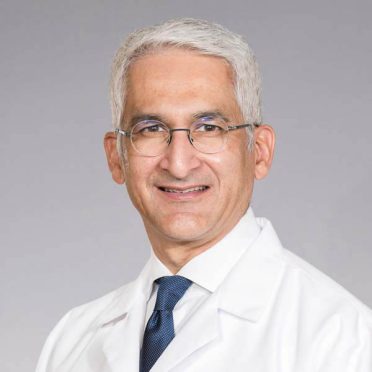If your medication list looks like those comically long CVS receipts, it’s time to talk to your doctor. “Taking too many medications can be dangerous, especially for older adults,” says Hartford HealthCare geriatrician Taimur Habib, MD.
In fact, studies show that mixing meds can be a major cause of disability, falls, frailty and decreased quality of life for the elderly. It can also be life-threatening.
But most patients don’t know it. Unless they regularly see a geriatrician — aka, a specialist in aging — their doctor might not either.
> Connect with the Center for Healthy Aging
Why is mixing medications more of a problem for older adults?
Basically, the more years we rack up on this planet, the more health issues we tend to acquire — and medicines to treat them. For many older adults, that includes everything from doctor-recommended prescriptions and over-the-counter meds to vitamins and dubious “miracle” supplements they find on their own.
Unfortunately, that can be a risky cocktail.
> Related: Modern-Day Snake Oil: The Problem With Brain Supplements
“With age, we absorb, metabolize and excrete medications differently,” says Dr. Habib. “So a dose for a younger individual may be too much for the elderly. And since we metabolize drugs differently with age, that increases the risk of harmful side effects when we combine them.”
Also, the more pills you take, the harder it is to keep everything straight. That might lead to skipped or double dosages, mistakes that come with problems of their own.
> Want more health news? Text StartHere to 85209 to sign up for text alerts
How do I know if I’m taking too many medications?
If you’re age 65 or older, the best person to answer this question is probably a geriatrician — a doctor who specializes in the health needs of older adults.
“First, note down all the medicines you’re taking, with the exact doses. Then take the list to your geriatrician for an annual review,” advises Dr. Habib.
Remember to include over-the-counter medicines and supplements. Even a harmless-sounding vitamin can lead to health issues, especially when it’s combined with your other supplements and prescription meds.
What signs and symptoms should I be concerned about?
“Always watch out for adverse symptoms after starting a new medicine or changing the dose of a medicine,” says Dr. Habib. “Taking multiple medications makes it more likely that you’ll experience side effects from any one of them.”
For example, that can include:
- Fatigue
- Constipation, diarrhea or incontinence
- Loss of appetite
- Confusion
- Depression
- Anxiety
- Weakness
- Tremors
- Dizziness
- Falls
- Hallucinations
- Skin rashes
What else should I ask my doctor about my medication regimen?
“Ask your doctor if the medicine is still relevant,” suggests Dr. Habib. “For instance, if you’re 95 years old, some chronic medicines like cholesterol-lowering medications may not be appropriate anymore. In addition, herbal supplements and over-the-counter medicines may not be providing the benefits they claim to provide.”
In general, the fewer your medications, the lower your risk for adverse side effects.
Plus, you can finally downsize your pill organizer.



